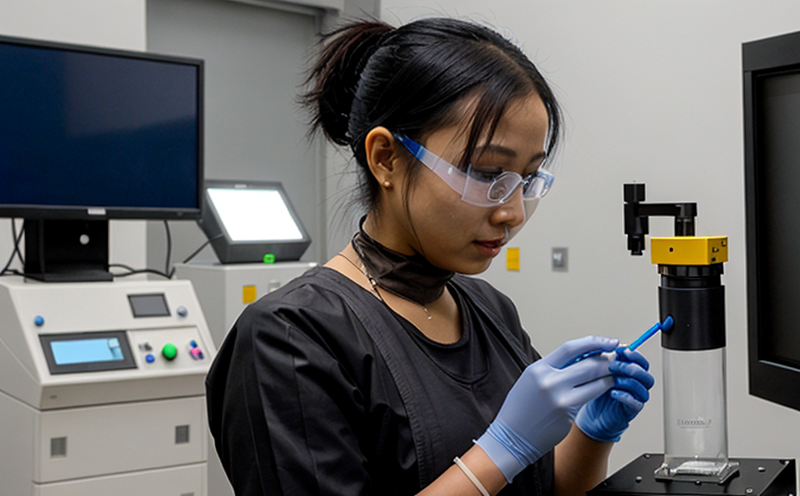ASTM D5061 Soil pH Testing with Nanoparticle Influence
The Nanomaterials Testing service includes a range of tests designed to evaluate the environmental impact and safety of nanomaterials. One such test is ASTM D5061, which focuses on measuring soil pH in the presence of nanoparticles. This testing method is essential for understanding how nanomaterials interact with their surrounding environment, particularly in soil systems.
Soil pH plays a critical role in determining the chemical behavior and bioavailability of contaminants within the soil. Changes in pH can affect the solubility of metals, the activity of microorganisms, and plant uptake of essential nutrients or toxic elements. When nanomaterials are introduced into this environment, they can influence the pH dynamics, potentially altering these crucial processes.
The ASTM D5061 test is particularly important in assessing the environmental behavior of engineered nanoparticles that may be released during industrial processes, agricultural applications, or accidental releases from consumer products. By measuring soil pH in the presence of nanomaterials, we can better understand how these particles interact with the surrounding environment and predict their potential impacts.
The testing process involves several key steps:
- Sample preparation: Soil samples are collected from various locations to ensure a representative sample.
- Nanoparticle dispersion: The nanoparticles of interest are dispersed in the soil matrix under controlled conditions.
- pH measurement: pH is measured using standardized methods, ensuring that any changes due to nanoparticle presence can be accurately quantified.
Accurate and reliable results from ASTM D5061 are essential for regulatory compliance, risk assessment, and environmental impact studies. The test helps in determining whether the introduction of nanoparticles into soil could lead to significant changes in pH that might affect ecological health.
The findings from this testing can inform decision-making processes related to the safe handling, use, and disposal of nanomaterials in various sectors such as agriculture, construction, and manufacturing. By providing insights into nanoparticle behavior in soil environments, ASTM D5061 plays a vital role in ensuring that nanotechnology contributes positively to environmental sustainability.
Understanding these interactions is crucial for developing strategies to mitigate any adverse effects of nanoparticles on the environment. This knowledge can also support the development of safer and more sustainable products by identifying potential areas for improvement in nanoparticle design and application.
Benefits
The benefits of ASTM D5061 Soil pH Testing with Nanoparticle Influence extend across multiple dimensions, offering significant advantages to various stakeholders involved in the nanotechnology sector. Compliance officers can leverage these tests to ensure adherence to stringent environmental regulations and standards.
For quality managers, this testing ensures that products meet high-quality benchmarks by providing accurate data on nanoparticle behavior within soil environments. R&D engineers benefit from a deeper understanding of how nanoparticles interact with their surroundings, which is invaluable for innovation in product design. Procurement professionals can use the results to select suppliers who adhere to best practices regarding environmental stewardship.
Environmental nanomaterials testing not only helps in complying with international standards like ISO and ASTM but also contributes to broader sustainability goals by promoting responsible use of nanotechnology. This service aids in reducing risks associated with accidental releases into natural ecosystems, thereby protecting both human health and the environment.
- Regulatory Compliance: Ensures adherence to environmental regulations and international standards.
- Risk Management: Identifies potential hazards associated with nanoparticle use early in the development process.
- Innovation Support: Provides valuable data for researchers and developers working on sustainable nanomaterials.
By integrating ASTM D5061 into their quality management systems, organizations can demonstrate a commitment to environmental responsibility and contribute positively to global sustainability efforts. This service supports the responsible use of nanotechnology in ways that are beneficial for both society and the planet.
Environmental and Sustainability Contributions
The testing of soil pH with nanoparticles using ASTM D5061 is a cornerstone of our environmental nanomaterials testing services. This test contributes significantly to the broader goals of environmental sustainability by providing critical insights into nanoparticle behavior within soil ecosystems.
Understanding how nanoparticles influence soil pH is essential for minimizing their adverse effects on ecological health. By identifying potential changes in soil chemistry, this test helps in predicting and mitigating risks associated with the release or disposal of nanomaterials into natural environments.
The results from ASTM D5061 can inform various strategies aimed at enhancing environmental sustainability, including:
- Development of safer and more environmentally friendly nanomaterials.
- Implementation of best practices for managing nanoparticle waste streams.
- Promotion of sustainable agricultural practices that incorporate engineered nanoparticles responsibly.
These contributions align with the United Nations' Sustainable Development Goals, particularly Goal 12 on responsible consumption and production. By ensuring that nanomaterials are used in a manner that minimizes environmental impact, we contribute to creating a more sustainable future for all.
The testing also supports the principles of circular economy by promoting the reuse and recycling of nanomaterials where possible. This not only reduces waste but also conserves resources and energy throughout the product lifecycle.
Competitive Advantage and Market Impact
- Innovation Leadership: Our ability to conduct ASTM D5061 tests sets us apart in the market, providing unique insights that drive innovation.
- Compliance Expertise: By staying ahead of regulatory changes, we ensure our clients remain compliant with the latest environmental standards.
- Data-Driven Decision Making: Accurate test results enable informed decisions about product design and market entry strategies.
- Reputation Building: A strong track record in nanomaterials testing enhances client confidence and trust.
In a highly competitive industry, these advantages give us a significant edge. Our expertise in ASTM D5061 and related tests positions us as leaders in environmental nanotechnology research and development. Clients can rely on our services to stay ahead of emerging trends and regulatory requirements, ensuring they remain at the forefront of sustainable practices.
The market impact of these tests is profound, as they contribute to reducing the environmental footprint of nanomaterials and promoting responsible use across industries. By addressing potential risks early in the development process, we help our clients navigate complex regulatory landscapes with confidence.





